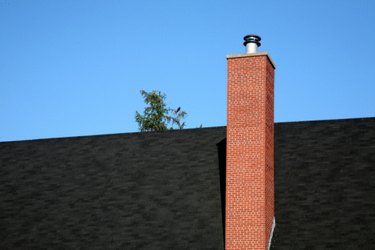Even though some homeowners prefer the natural look of a brick, stone or even concrete block chimney, a good coat of paint can add a distinctive flair to your house. Painting a chimney, however, is a bold move that should not be taken lightly. First, before you begin painting, consider the fact that once the job is done, the paint will be quite difficult to remove. This is due to the fact that brick, stone and concrete tend to have a porous texture. The actual task of painting a chimney should prove a relatively simple task.

Video of the Day
Things You'll Need
Small Touch-Up Brush
Plastic Scraper Or 80-Grit Sandpaper (If Needed)
Ladder
Paint Rollers
Paint Roller Pans
Exterior Latex Paint
Scrub Brush
Pressure Washer (Optional)
Painter’S Or Masking Tape (If Needed)
Acrylic Mortar Patch (If Needed)
Primer
Laundry Detergent
Bucket
Caulk
Step 1
Clean the exterior surface of the chimney. The best tool to thoroughly clean the chimney is a pressure washer set at roughly 1,500 or 2,000 PSI. If you have access to a pressure washer or opt to rent one from local rental center, you should also purchase a small bottle of mild soap. If you don't wish to use a pressure washer, clean the chimney by hand using a sturdy scrub brush and some laundry detergent dissolved in a bucket of warm water.
Video of the Day
Step 2
Allow the surface of the chimney to dry out. Check the chimney for any loose and/or missing mortar. If you find areas of damaged mortar, repair it with acrylic mortar patch. Acrylic mortar patch can be purchased at most building supply stores and comes in a tube-like package similar to caulk. If the chimney was painted previously, remove any loose or flaking paint with a scraper or 80-grit sandpaper.
Step 3
Apply an acrylic or universal primer to the surface of the chimney. The primer will help seal the surface and make it easier for you to apply the actual coat of paint. Use a roller to spread the coat of primer onto the chimney. Wait for the primer to dry completely before attempting to paint.
Step 4
Fill any holes, cracks or gaps in the surface of the chimney with caulk. Basically, caulk any opening that is larger than 1/16th of an inch. This will prevent water from seeping into the surface of the chimney, potentially damaging it and the paint.
Step 5
Paint the exterior surface of the chimney with a quality latex exterior paint. Apply the paint with a thick paint roller. If you don't have a roller, you may use a paint brush, though it will take longer to cover the chimney. Use a small touch-up brush to get any hard-to-reach areas or crevices.
Tip
If you’re using a ladder to paint the upper portion of a chimney, make sure the ladder is situated on solid, even ground. Also, ensure the ladder is close enough to the chimney so that you do not have to lean dangerously to the side in order to paint. Your hips should remain within the width of the ladder at all times. If you’re worried about accidentally getting paint on the siding of your house, tape a drop cloth between the chimney and the siding with painter’s or masking tape.